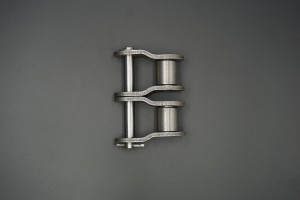Roller chains are an important component in a variety of industrial applications, including manufacturing, agricultural and automotive machinery. Designed to transmit power efficiently and reliably, these chains are critical to the smooth operation of equipment and machinery. However, to ensure its longevity and performance, roller chains must undergo a heat treatment process to maximize their durability and strength.
Heat treatment is a critical step in roller chain manufacturing as it can significantly improve the mechanical properties of the roller chain as well as its wear and fatigue resistance. By subjecting the chain to a controlled heating and cooling process, the material’s microstructure can be changed to improve hardness, toughness and overall performance. This article will take an in-depth look at the importance of heat treatment in maximizing roller chain durability and the various techniques involved in the process.
The main purpose of roller chain heat treatment is to achieve the ideal balance of material hardness and toughness. This is achieved through a series of carefully controlled heating and cooling cycles designed to change the chain’s microstructure at the atomic level. The most common heat treatment techniques for roller chains include quenching and tempering, carburizing and induction hardening.
Quenching and tempering is a widely used heat treatment process for roller chains. It heats the chain to a specific temperature and then quickly cools it in a quenching medium such as oil or water. This rapid cooling creates a hardened structure that increases the surface hardness and wear resistance of the chain. The chain is then tempered by reheating it to a lower temperature, which gives the chain toughness and reduces internal stress, thereby increasing its overall durability.
Carburizing is another effective heat treatment method for roller chains, especially for applications requiring high surface hardness and wear resistance. During the carburizing process, the chain is exposed to a carbon-rich atmosphere at high temperatures, allowing carbon atoms to diffuse into the surface layer of the material. This results in a hardened outer shell with a tough core, providing excellent wear and fatigue resistance while maintaining the overall strength of the chain.
Induction hardening is a specialized heat treatment technique often used to selectively harden specific areas of roller chains, such as load-bearing surfaces and contact points. In this process, high-frequency induction heating is used to rapidly heat the target area, which is then quenched to achieve the desired hardness. Induction hardening allows precise control of quenching depth and minimizes deformation, making it ideal for enhancing the durability of critical components within roller chains.
In addition to these heat treatment techniques, material selection plays a vital role in maximizing roller chain durability. High-quality alloy steels, such as 4140, 4340 and 8620, are commonly used to manufacture roller chains due to their excellent hardenability and strength. These materials are well suited to heat treatment processes and are able to achieve the required mechanical properties, which are critical to withstand the harsh operating conditions experienced by roller chains.
Maximizing the durability of a roller chain through heat treatment not only extends its service life, but also helps improve the overall efficiency and reliability of the machinery it is used on. Properly heat-treated roller chains offer superior wear, fatigue and corrosion resistance, reducing maintenance requirements and downtime while ensuring consistent performance in demanding industrial environments.
In summary, heat treatment is a key aspect in maximizing roller chain durability. By subjecting the chain to specialized heat treatment processes such as tempering, carburizing, and induction quenching, the mechanical properties of the chain can be significantly improved, thereby improving hardness, toughness, and wear resistance. Combined with the use of high-quality alloy steel, heat treatment plays a key role in ensuring the service life and reliability of roller chains in various industrial applications. Therefore, manufacturers and end-users should prioritize implementing appropriate heat treatment practices to optimize the performance and durability of roller chains in their machinery and equipment.
Post time: Jul-22-2024

